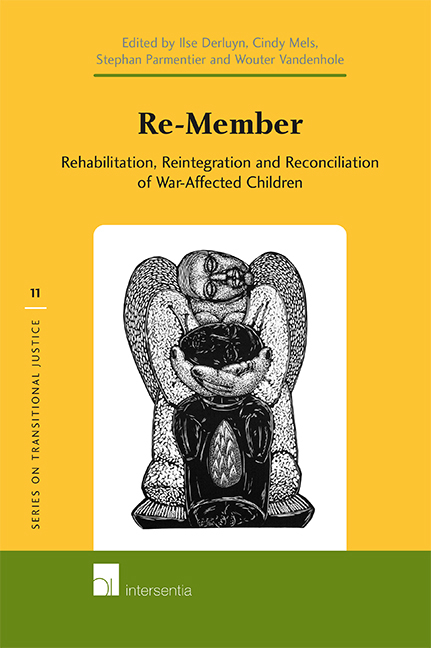Book contents
- Frontmatter
- Preface
- Foreword
- Contents
- Introduction: Children Affected by Armed Conflict at the Intersection of Three Fields of Study
- PART I SETTING THE SCENE: THREE DISCIPLINARY PERSPECTIVES
- PART II LESSONS LEARNT FROM CURRENT PRACTICES AND APPROACHES
- PART III EXPLORING RESOURCES THROUGH EMPIRICAL RESEARCH
- PART IV LOOKING BACK, REACHING FORWARD
- About the Editors
- About the Authors
Foreword
Published online by Cambridge University Press: 20 January 2021
- Frontmatter
- Preface
- Foreword
- Contents
- Introduction: Children Affected by Armed Conflict at the Intersection of Three Fields of Study
- PART I SETTING THE SCENE: THREE DISCIPLINARY PERSPECTIVES
- PART II LESSONS LEARNT FROM CURRENT PRACTICES AND APPROACHES
- PART III EXPLORING RESOURCES THROUGH EMPIRICAL RESEARCH
- PART IV LOOKING BACK, REACHING FORWARD
- About the Editors
- About the Authors
Summary
This book is a most welcome contribution to the growing body of multidisciplinary scholarship on children's rights. By focusing on recovery, reconciliation and reintegration, it expands the scope of much of the literature on children in armed conflict from the recruitment and participation of child soldiers to the broader questions of rebuilding societies and healing and reintegrating children who have been affected by armed conflict.
I will use the opportunity given to me to write a foreword to set an agenda for action at the international level that may facilitate reconciliation, recovery and reintegration. I will insist in particular on the need for prevention; universal ratification of the Optional Protocol to the Convention on the Rights of the Child on the Involvement of Children in Armed Conflict (OPAC); the adoption of the Paris Principles and Guidelines by the UN General Assembly; and the establishment of a fund for the recovery and reintegration of children affected by armed conflict (CAACs). But first, by way of preliminary question, I will examine whether the recovery and reintegration of CAACs is a matter of human rights or international humanitarian law. Before I present my agenda for action, I will introduce a children's rights approach, in which I will try to identify the specific rights of war-affected children and the related obligations of states and others.
REHABILITATION AND REINTEGRATION OF WAR-AFFECTED CHILDREN: A HUMAN RIGHTS MATTER (?)
INTERNATIONAL HUMANITARIAN LAW
International instruments of humanitarian law are important for the protection of children affected by war, notably the Geneva Convention relative to Protectionof Civilian Persons in Time of War (1949). They contain various provisions for the protection of children under the age of 15, i.e. parties to a conflict have to take measures necessary to ensure that children under fifteen who are orphaned or are separated from their families as a result of the war are not left to their own resources and that their maintenance and education are facilitated in all circumstances. Furthermore, parties to the conflict must endeavour to arrange for all children under twelve to be identified by the wearing of identity discs or by some other means (Art. 24).
- Type
- Chapter
- Information
- Re-MemberRehabilitation, Reintegration and Reconciliation of War-Affected Children, pp. ix - xxivPublisher: IntersentiaPrint publication year: 2012
- 18
- Cited by



